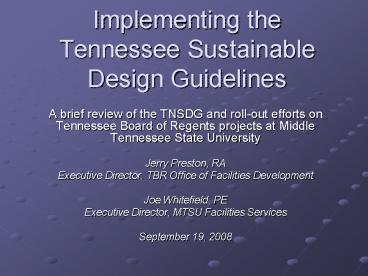Implementing the Tennessee Sustainable Design Guidelines - PowerPoint PPT Presentation
1 / 27
Title: Implementing the Tennessee Sustainable Design Guidelines
1
Implementing the Tennessee Sustainable Design
Guidelines
- A brief review of the TNSDG and roll-out efforts
on Tennessee Board of Regents projects at Middle
Tennessee State University - Jerry Preston, RA
- Executive Director, TBR Office of Facilities
Development - Joe Whitefield, PE
- Executive Director, MTSU Facilities Services
- September 19, 2008
2
Sustainability Headlines
3
(No Transcript)
4
(No Transcript)
5
(No Transcript)
6
(No Transcript)
7
TNSDG Purpose and Intent
- The Tennessee SDG is a project approved by the
State Building Commission that is to be utilized
by Real Property Administration (RPA), Tennessee
Board of Regents (TBR), and the University of
Tennessee (UT) as part of their designer manuals
as a minimum standard and guideline for designers
to insure that the principles of good sustainable
design and construction practices are being
implemented on State of Tennessee projects - All measures being considered for credit
compliance shall have an appropriate evaluation
of costs (capital and operating) to and benefits
(economic, environmental, and social) for the
Owner - The SDG will be used as a design tool for all new
construction, renovation, and maintenance
projects... - These guidelines have been formulated using the
US Green Building Council's LEED standards as a
basis of comparison and are tailored specifically
for State government use as they relate to
projects developed by RPA, TBR, and UT.
8
Goals for the TNSDG and TBR
- Require sustainability be considered and
implemented on all TBR projects - Seek appropriate balance of environmental and
fiscal responsibilities and realities - The TNSDG have been customized (in wording and
format) to incorporate goals above for State
projects including higher education
9
Lead of the Story
- TNSDG provides sustainability template for State
projects project team still responsible,
however, for determining appropriate measures - Economic Cost/Benefit
- Environmental Cost/Benefit
- Social Cost/Benefit
10
Assessing Customer Demand
Sustainability
Inside the Tornado, Geoffrey A. Moore
11
Defining the Customers/Owners
- Innovators Enthusiasts
- Fundamentally committed to ideal, pays highest
price - Early Adopters Visionaries
- Want to exploit the new capability to gain a
dramatic competitive advantage - Early Majority Pragmatists
- Jump in to make their companies systems more
effective - Late Majority Conservatives
- Price sensitive
- Laggards Skeptics
- Delight in being critics
12
(No Transcript)
13
TBRs Owner Profile - History on Energy and
Environmental Issues
- Estimated utilities expense for FY 08-09 for all
universities, community colleges, and technology
centers - 68m (2.27/sf on 30m sf) - 68 CFC chillers replaced at 16 institutions
- 53.75m invested in Energy Savings Performance
Contracting at 12 institutions - Increased use of geothermal
- Investment in commissioning for better performing
buildings - Large purchaser of green power through TVAs
Green Power Switch Program
14
Where is TBR in the Sustainability Adoption Cycle?
Sustainability
idealistically
fiscally
Inside the Tornado, Geoffrey A. Moore
15
Competing Priorities
- There are several conditions (mostly economic)
that make it difficult for the TBR institutions
to be at the leading edge of sustainable design - Limited Capital (First Cost Concerns)
- Limited/Reduced Operating (Future Cost
Concerns) - Affects of Deferred Maintenance
16
Competing Priorities for TBR Campuses- Deferred
Maintenance - (MTSU Campus Master Plan 2007)
17
TNSDG Implementation
18
(No Transcript)
19
TNSDG Credits
- Honor System in Design and Verification Process
- One credit does not fit all potential measures
need to be project specific - TNSDG Required, Recommended, and Optional
categories are a first cut evaluation
20
Evaluating the Credits and Measures
- Yes, No, Maybe, NA (point or no point)
- Regional Popularity (LEED history)
- Dont forget the Economics (Capital and
Operational) - Recommended
- Optional
21
TBR Examples of TNSDG LEED at MTSU
22
Issues Knocking at the Door for Higher Education
23
Presidents Climate CommitmentAmerican College
and University Presidents Climate Commitment
- Within two months
- Establish committee to guide, develop, and
implement plan - Select two tangible actions to be completed while
developing a long-term climate action plan - Within one year (and annually thereafter)
- Complete an inventory and publicly report on
greenhouse gas emissions
24
Presidents Climate Commitment Contd
- Within two years
- Develop a climate action plan that includes a
target date and interim milestones for achieving
climate neutrality (no net greenhouse gas
emissions carbon is the largest of 7 ghgs) - Within three years
- Report greenhouse gas emissions and progress in
implementing action plan - Within four years
- Continue to report emissions data annually and
submit narrative progress reports every other year
25
Carbon Neutrality
- Carbon Foot-printing
- Reduce
- Buy your way out of the remainder
- True Carbon Reduction
- Focus will be on energy reduction from existing
buildings - Carbon Trading
- What happens when you create a market?
26
- Questions
27
Implementing the Tennessee Sustainable Design
Guidelines
- A brief review of the TNSDG and roll-out efforts
on Tennessee Board of Regents projects at Middle
Tennessee State University - Jerry Preston, RA
- Executive Director, TBR Office of Facilities
Development - Joe Whitefield, PE
- Executive Director, MTSU Facilities Services
- September 19, 2008































